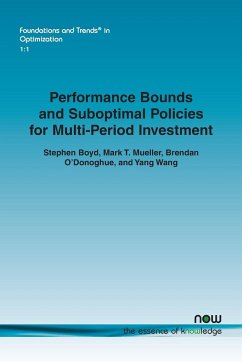Performance Bounds and Suboptimal Policies for Multi-Period Investment examines dynamic trading of a portfolio of assets in discrete periods over a finite time horizon, with arbitrary time-varying distribution of asset returns. The goal is to maximize the total expected revenue from the portfolio, while respecting constraints on the portfolio like a required terminal portfolio and leverage and risk limits. The revenue takes into account the gross cash generated in trades, transaction costs, and costs associated with the positions, such as fees for holding short positions. The model that is presented takes the form of a stochastic control problem with linear dynamics and convex cost function and constraints. While this problem can be tractably solved in several special cases - for example, when all costs are convex quadratic, or when there are no transaction costs - the focus is on the more general case, with nonquadratic cost terms and transaction costs. Performance Bounds and Suboptimal Policies for Multi-Period Investment shows how to use linear matrix inequality techniques and semidefinite programming to produce a quadratic bound on the value function, which in turn gives a bound on the optimal performance. This performance bound can be used to judge the performance obtained by any suboptimal policy. As a by-product of the performance bound computation, an approximate dynamic programming policy is obtained that requires the solution of a convex optimization problem, often a quadratic program, to determine the trades to carry out in each step.
Hinweis: Dieser Artikel kann nur an eine deutsche Lieferadresse ausgeliefert werden.
Hinweis: Dieser Artikel kann nur an eine deutsche Lieferadresse ausgeliefert werden.








